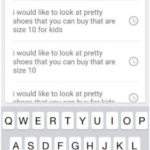If you’ve owned a smartphone since 2013, or bought a Microsoft laptop, then you have a digital assistant at your disposal. “Digital assistants” are today’s tech-term for Siri (iPhones), Alexa (Amazon), Google Now (Android), Cortana (Microsoft), and a growing number of other artificial intelligence gadgets. These programs combine language processing technology, text to speech technology, and specific pre-programmed tools that allow you to speak directly to them and receive information as if you are having a conversation.
Whether or not you personally feel comfortable talking to your phone, tablet, laptop, or game console, the fact of the matter is that more and more people are using these digital assistants to search on the internet each month. Google CEO Sundar Pichai recently said that 1 in every 5 searches made with a google android app in the United States is in a voice query. According to ComScore, at least half of all searches will be made via voice query by 2020.
Ultimately, voice search is changing the way people find information because it helps people get immediate answers to their questions without directly opening a browser. Voice searches, of course, receive ads in their SERPs. The big question for marketers is: Are your ads showing up?
How Do Voice Searches Work?
Voice searches differ from traditional online searches in both length and language. On a computer, the average search will contain two keywords. Voice searches will use at least three. This is because on a computer, a consumer will search broadly and narrow down. Voice searches are much more specialized and include natural languages with a conversational tone.
When a search on the computer might be “black boots,” a marketer will have to structure her ad campaign based on a guess of what this consumer really wants. A voice search would be more specific: “Show me size seven suede boots with a two-inch heel.”
An example of the common nature of voice searches comes from this photo, which comes from Tom Anthony of Distilled and his daughter.

Because voice searches are conducted with such natural language, marketers can easily determine the searcher’s intent. We can determine who is interested, what they want, when, how, and we can determine that they are ready to act.
Voice search also varies from text searches in that voice searches are more likely to be questions. For instance, someone might search “weather in New York” on their computer, but ask a digital assistant, “What is the weather like in New York?”
How to Capitalize Off Voice Searches
- Anticipate specific questions and bid higher on these. Because you know voice-searches are more likely questions, you can review your highest value question phrases and optimize for those keywords. Start to predict what users might be asking by conducting search traffic and keyword research. Additionally consider how people ask questions by thinking aloud.
- Tailor ad copy and landing pages. Aim your copy towards your highest value search-questions. As you start to realize the kinds of questions your users are asking, write the answers to those questions with targeted keywords in your search campaigns. Additionally use keywords for voice searches in your search engine optimization.
- Keep content conversational. Remember to add extra words to your key phrases like “the,” “a,” and “of,” to make your copy more conversational. This reflects the way people speak and is more of an exact match to potential voice searches.
- Make sure your website is mobile ready. Have you optimized your site for mobile devices? If not, be sure to review our best practices for AMP pages.
- Optimize for local ads. If your business is local, you have a lot to gain from voice-search. Many searches include “near me,” such as “best italian restaurant near me” or “student loan credit union near me.” Get smart with your keywords and make them relevant for local searches. Be aware of local events happening around your business or any landmarks near you. Think of keywords that people would use to describe your business and local area and consider optimizing for these.
- See for yourself. Since you or someone you work with likely has access to a digital assistant, you can use the tool yourself to understand how your target audience is searching. Organizing focus groups gives you an opportunity to obtain direct feedback on whether or not your search strategy is working. Conducting surveys to users can also give you information on what your users are specifically looking for, how they are searching for it, and even which phrases they are using in their search.

